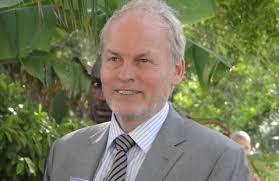Somalia’s Year of Delivery

Nicholas Kay, the Special Representative of the UN Secretary-General to Somalia, has expressed some optimism over progress in Somalia. In an article for Al Jazeera, he looks back on 2014 and forward to 2015, noting that Somalia is succeeding in recovering from decades of internal conflict. From a failed state, he says, it is now a fragile state on the path to stability and eventual prosperity. He does not minimize the challenges but he says despite these Somalia made impressive strides in 2014 with Somalis leading the process.
Equally, he says “much of this could not be achieved without a strong international partnership.” He acknowledges the enormous contribution and the sacrifices made by the African Union and AMISOM. He notes the support provided by the EU and by others including the US, Turkey and the UAE. He also elaborates on the work of the United Nations, the largest international entity in Somalia. It has on average 450 international staff and 1,000 Somali staff in the country, providing “vital political, logistical, humanitarian and development support nationwide.”
The SRSG acknowledges that Somalia is a hard place to work in and that its needs are enormous, but, he says, the UN can be proud of its contribution, and its work in improving the lives of millions of Somalis. More than a million Somalis receive life-saving food and livelihood support; including 180,000 severely malnourished children under the age of five. It distributed 2.8 million vaccine doses last year, to immunize children against polio and measles. 40,000 children were able to attend school for the first time ever. Some 24 million livestock were also vaccinated or given veterinary care. During the year 17,000 national army and police registered for a new biometrical payment system; short-term employment was created for over 400,000 men and women altogether; 300 members of the Somali Diaspora were employed in senior, technical positions; and 500 refugees were voluntarily resettled in Somalia from Kenya.
Mr. Kay underlines that Somalia’s development and future depends upon security. The UN, of course, supports the 22,126 troops and police of AMISOM, the world’s largest mandated peace operation, logistically through UN Support Office for AMISOM (UNSOA). It also now gives logistic support to nearly 8,000 Somali National Army Forces. This has helped the Federal Government and AMISOM to recover nearly 20 towns and strategic locations from Al-Shabaab, “the most dramatic expansion of state authority in Somalia for decades”. Indeed, Mr. Kay says, 2014 saw “the balance tipped decisively against Al-Shabaab and in favour of eventual peace firmly rooted in a culture of rule of law.”
Mr. Kay also notes the progress towards Somalia becoming a strong, united federal state with the Provisional Federal Constitution setting out an ambitious agenda for creating federal member states,
agreeing to a new constitution and democratizing the country. Progress, he says, may be behind schedule, but such transformations cannot be engineered from the outside, and they cannot be achieved overnight. The UN, he said, had lent significant political and technical support to the process, including the emerging Interim South West Administration.
Looking forward into 2015, Mr. Kay describes Prime Minister Omar Abdirashid Ali Sharmarke’s list of things to do as “daunting”. Somalia, he points out, still needs to complete its ambitious task of political engineering and recreate itself as a federal state with powers, revenues and resources shared between the centre and the emerging federal member states. The government, he says, in partnership with the international community, must strengthen Somali institutions and systems for financial accountability and restore public confidence. 2015, he said, must be “the Year of Delivery for the New Deal Somali Compact” In other words; programs to build peace and the state must be coordinated, funded and launched. Somalis, he says, will judge the Government when its term expires in September 2016 “according to whether it has delivered benefits for them in their daily lives, whether it has improved security, justice, schools, healthcare and jobs.” The UN will also be held accountable then too, as it is the linchpin for AMISOM and Somali peace operations and as the most present international organization in Somalia.
Mr. Kay concludes by emphasizing that he is determined that the UN in 2015 will hold its nerve, “expand our presence and continue to help Somalis wake gently from their two decade-long nightmare.”
Source:All Africa